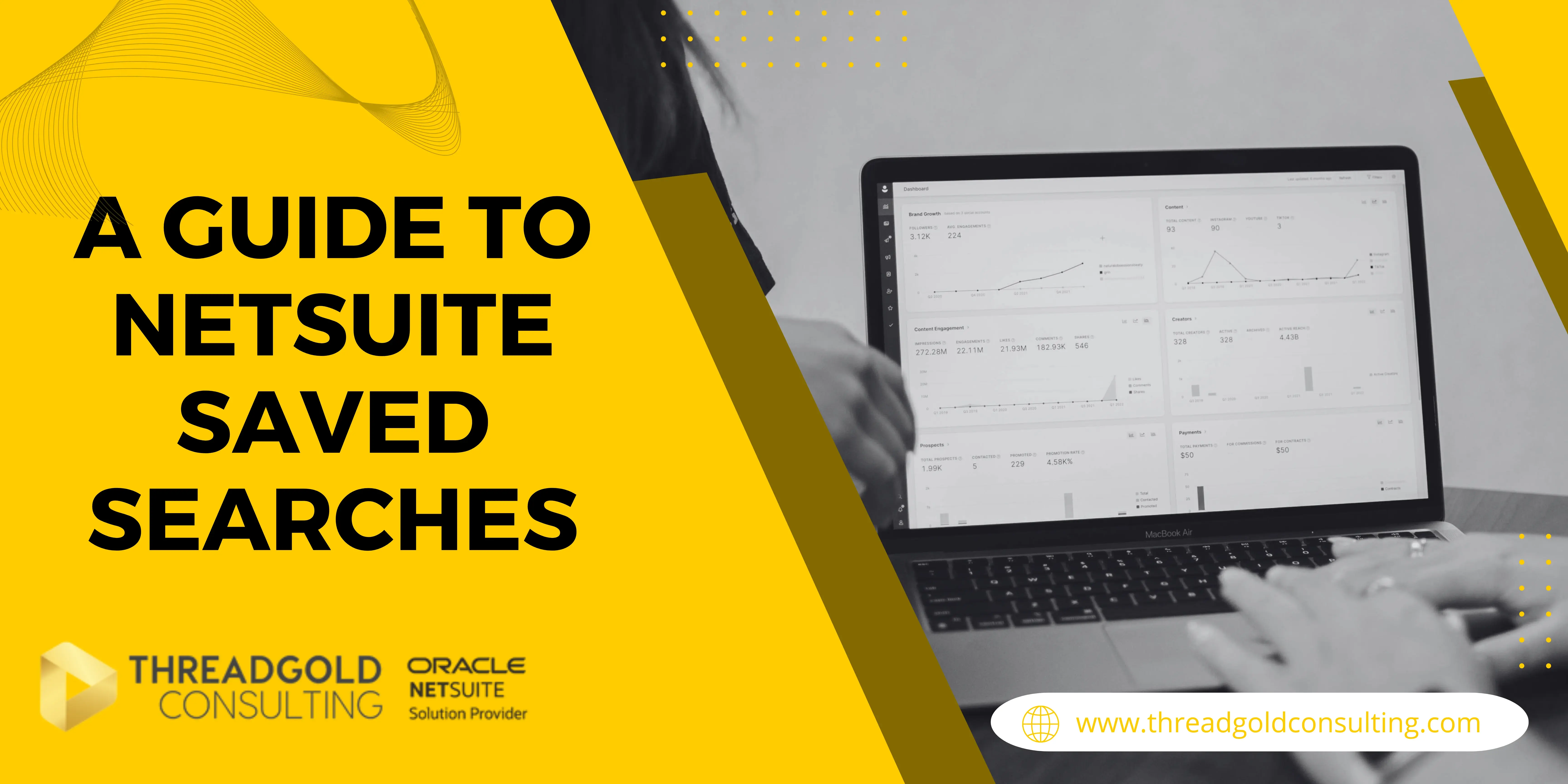Reporting is an essential feature within any ERP system. It enables business owners and managers to track their progress, identify areas for improvement, and deliver valuable insights to stakeholders. Through comprehensive and customisable reporting features, NetSuite helps businesses optimise their operations and make informed decisions. NetSuite has some of the most extensive reporting capabilities on the market, and this blog post will take you through exactly that.
NetSuite reporting is powered by a suite of tools known as SuiteAnalytics. SuiteAnalytics includes features like Saved Searches, KPIs, Workbooks, and integration options that allow you to visualise and analyse business data in real time. Whether you're a finance manager, operations lead, or business analyst, NetSuite reporting through SuiteAnalytics gives you everything you need to dig deep into your data.
Why is Reporting Important?
The first question to ask is why do we actually need to care about reporting? Effective reporting is vital for any business to ensure decisions are data-driven and reflective of the current market conditions. Many organisations rely on excel spreadsheets and graphs as their sole form of reporting, which is inefficient and time consuming.
Having a system that can automatically create and update reports allows your team to spend more time on tasks that actually move the needle. Effective reporting is also essential for:
- Helping businesses track progress
- Forecasting future trends
- Identifying areas requiring attention or improvement
- Ensuring employees are billing enough hours
- Maintaining compliance with financial regulations and standards
- Safeguarding the company from potential legal issues
By prioritising your reporting, you will be prioritising the continued growth of your business.
What Reporting Features Does NetSuite Offer?
Standard Reports
Firstly, NetSuite offers all the standard reports that you'd expect any accounting software to offer. This includes, profit and loss reports, cash flow statements, and balance sheets.
These reports provide a comprehensive overview of income and expenses, helping business owners and stakeholders understand profitability during a specific period. Regular access to such reports supports strategic financial planning and helps in identifying potential areas for cost reduction and revenue enhancement.
Example: A finance manager might pull a standard Profit & Loss report at the end of each month to track how departmental spending aligns with budget forecasts.
Saved Searches
NetSuite’s saved searches feature allow for the creation of custom reports that are tailored to specific business needs, using Oracle SQL for data querying. The feature is easy to use and doesn't require any technical coding, meaning employees have total flexibility to report on whatever they require, from operational efficiency to detailed customer behavior insights.
Saved searches (as it says in the same!) can be saved and reused, and they can be either private or public, allowing users to share the report with their team. This helps teams to increase productivity and improve efficiency.
Example: A sales manager might set up a saved search to track all open opportunities over a certain value, filtered by territory, and have it emailed to the team every Monday morning.

SuiteAnalytics Connect
SuiteAnalytics Connect extends NetSuite’s capabilities by allowing users to connect with any third-party tool or any custom-built application on any type of device using Windows, Linux, or OS X operating system. SuiteAnalytics Connect can use ODBC, JDBC and ADO to facilitate these integrations. The most common connection is with power BI, and it's extremely simple to set up, however our consultants at Threadgold Consulting are on hand to offer support if you find yourself struggling.
This connectivity allows businesses to important NetSuite's data into the external tool of their choice, creating richer, more comprehensive reports. It’s especially beneficial for businesses that operate across multiple platforms, needing a unified view of all data streams.
Example: A marketing analyst could blend NetSuite financials with campaign data from HubSpot in Power BI, to measure the ROI of their initiatives in real-time.
SuiteAnalytics Workbook
NetSuite's SuiteAnalytics Workbook allows users to create complex filtering systems, which they can use to access and interpret lots of different criteria. The workbook provides an advanced pivot table feature, allowing users to manipulate and interact with data dynamically.
This tool is essential for performing complex data analysis, enabling users to drill down into metrics and uncover hidden insights within large datasets. This pivot table function can also be turned into charts and graphs, offering a visual way to show data that is easy to understand.
Example: A CFO may use a workbook to filter revenue data by product line, time period, and region, then visualise this in a bar chart to identify top-performing areas.

NetSuite Data Warehouse
The NetSuite Data Warehouse aggregates data from multiple sources, including internal NetSuite records and external applications like Shopify and Salesforce. It enables businesses to generate comprehensive reports that provide a holistic view of the organization's operations. This consolidated approach not only enhances data accuracy but also simplifies the reporting process, making it easier to derive meaningful insights across various business functions.
Example: A business using both NetSuite and Shopify might combine sales and fulfilment data to track delivery performance and customer satisfaction.
SuiteAnalytics KPI
Key performance indicators (KPIs) are a great way for businesses to benchmark progress. By setting a minimum standard for success, you can easily tell whether your organisation is hitting its targets, and if not, whether further action needs to talk place. NetSuite offers the ability to create your own KPIs and display them in a personalised dashboard, making it quick and easy to see your progress.
Example: A customer service manager may track average resolution time as a KPI and set alerts if it rises above a certain threshold.

Benefits of Using SuiteAnalytics
Improved Decision-Making
NetSuite is one of the few ERPs that offers real-time data insights. Many ERPs reply on batch processing of their data, often at the end of the day, meaning you can't always get to the minute reports on your progress. With real-time access to data and advanced reporting tools, SuiteAnalytics enables businesses to make well-informed decisions swiftly.
This capability is crucial in rapidly changing markets where timely information can dictate business success. Improved decision-making leads to better resource allocation, strategic planning, and competitive advantage.
Streamlined Processes
NetSuite automates many aspects of the reporting process, from data collection to the generation of complex reports. This automation saves time, reduces the likelihood of human error, and allows employees to focus on higher-value activities such as data analysis and interpretation.
Streamlined processes result in more efficient operations and can significantly reduce the cost and effort associated with manual reporting.
Enhanced Data Accuracy for International Businesses
If you are an international business operating across multiple entities, reporting can be a massive headache. NetSuite is perfect for businesses like this due to it's advanced financial consolidation module, NetSuite OneWorld. OneWorld handles everything from currency exchange, to inter-company transactions, to managing the various tax and regulation in multiple countries.
It then brings all this together and offers accurate reporting, allowing business owners to see their progress within entities, and as a whole. NetSuite is the best on the market in terms of financial consolidation, so this is a massive benefit global enterprises.
How to Make The Most Out Of NetSuite's Reporting Capabilities
Here are a couple of best practice that will ensure you are getting the most out of your NetSuite solution.
Leverage All the Available Capabilities
To fully benefit from NetSuite’s reporting, businesses should leverage all available tools and features, from real-time dashboards to advanced analytics. Utilising the full range of NetSuite's capabilities allows for a deeper and more varied analysis, providing insights that might not be visible through standard reporting methods.
Integrate Data Sources from All Your Sources
Integrating data from all available sources into NetSuite enhances the completeness of reports, providing a more detailed and accurate picture of business performance. This integration involves not only traditional data but also data from new sources such as social media and IoT devices, which can provide additional insights into customer behavior and operational efficiency. It may seem like a long task to get set up, but your NetSuite partner will handle this all for you and it will be worth it in the long run.
Regularly Review Your Reports and Optimise for Accurate Insights
We advise that you regularly review and optimise all of your reports to ensure they remain relevant and continue to provide value as the business evolves. This practice involves not only updating the data sources and metrics used but also refining the reporting processes and tools in response to new business challenges and opportunities. Continuous improvement in reporting ensures that the business remains agile and responsive to changes.
By implementing these strategies and making full use of NetSuite’s reporting capabilities, businesses can enhance their operational intelligence, drive better decision-making, and maintain a competitive edge in their respective industries.
FAQs
Q: What is NetSuite SuiteAnalytics?
A: SuiteAnalytics is NetSuite’s built-in reporting and analytics suite. It includes tools like Saved Searches, KPIs, Workbooks, and Connect, enabling businesses to generate real-time insights, visualize data, and create custom reports, all within the NetSuite ecosystem.
Q: How do I run a report in NetSuite?
A: You can run reports in several ways. By accessing standard financial reports, building custom reports using Saved Searches, using SuiteAnalytics Workbooks for pivot-style reporting, or connecting to external tools like Power BI via SuiteAnalytics Connect. Your ability to access each method depends on your NetSuite license and user role.
Q: Can I use Power BI with NetSuite?
A: Yes, SuiteAnalytics Connect allows for integration with Power BI, Tableau, and other external BI tools using ODBC, JDBC, or ADO connections. This makes it easy to build more advanced, cross-platform dashboards. Our team at Threadgold Consulting can help set this up quickly and ensure data syncs correctly.
Q: Is SuiteAnalytics included in all NetSuite plans?
A: Some components like Saved Searches and KPI dashboards are available in most standard NetSuite roles. More advanced tools like SuiteAnalytics Workbook and Connect may require specific role access or add-on licensing. Check with your NetSuite administrator to see what’s included in your account.
Q: Can I buy SuiteAnalytics separately from NetSuite ERP?
A: No, SuiteAnalytics is not sold as a standalone product. It's a module within the NetSuite ERP system and requires a full NetSuite license to access.
Q: What’s the difference between Saved Searches and Workbooks?
A: Saved Searches are great for quick, reusable queries and alerts, and are often used operationally across teams. Workbooks are more visual and analytical, offering advanced filtering, pivoting, and charting, best used for deeper data exploration and trend analysis.





